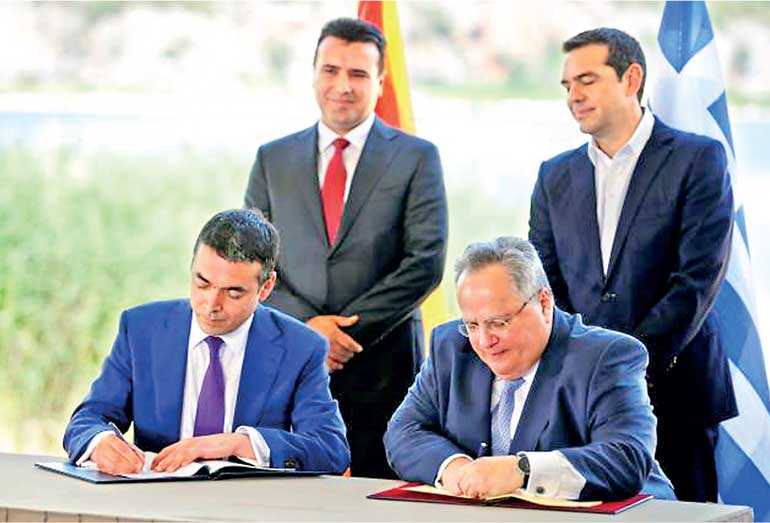Thursday Feb 26, 2026
Thursday Feb 26, 2026
Monday, 18 June 2018 00:00 - - {{hitsCtrl.values.hits}}

Greek Foreign Minister Nikos Kotzias and his Macedonian counterpart Nikola Dimitrov sign an accord to settle a long dispute over the former Yugoslav republic’s name as Greek Prime Minister Alexis Tsipras and Macedonian Prime Minister Zoran Zaev look on in the village of Psarades, in Prespes, Greece, 17 June – Reuters
PRESPES, Greece (Reuters): Greece and Macedonia defied protests and set aside decades of dispute on Sunday as they agreed on a new name for the Balkan state, potentially paving the way for Skopje’s admission to the EU and NATO.
The foreign ministers of Greece and Macedonia signed an accord to rename the former Yugoslav republic the “Republic of North Macedonia,” despite a storm of protest over a deal seen as a national sellout by some on both sides.
In the idyllic setting of Prespes, a lake region which borders Greece, Macedonia and Albania, officials from the two countries embraced, shook hands and penned a deal in the presence of European and United Nations officials.
The agreement still requires the approval of both parliaments and a referendum in Macedonia. That approval is far from assured, as it faces stiff opposition from the Greek public, and Macedonia’s president has vowed to block the deal.
“We have a historic responsibility that this deal is not held in abeyance, and I am confident that we will manage it,” Greek Prime Minister Alexis Tsipras said as he and his Macedonian counterpart Zoran Zaev received a standing ovation from guests at the lakeside ceremony. Tsipras survived a no-confidence vote mounted by Greece’s opposition in parliament on Saturday, but the depth of public emotion against the deal is strong.
Up to 70% of Greeks object to the compromise, an opinion poll by the Proto Thema newspaper showed on Saturday. In Psarades, the tiny lakeside community where the deal was signed, the village church bell tolled in mourning, draped in a Greek flag. Under the deal, Greece will lift its objections to the renamed nation joining the EU and NATO.
“Our two countries have to turn from the past and look to the future,” Zaev said. “We were bold enough to take a step forward.”
Greece has been in dispute with Macedonia since 1991 over the former Yugoslav republic’s name, arguing it could imply territorial claims over the Greek province of Macedonia and an appropriation of ancient Greek culture and civilisation. The subject is an emotional one for many Greeks. On Saturday, thousands of protesters outside the parliament building shouted “Traitor, traitor!” as lawmakers debated inside.
Veteran UN mediator Matthew Nimetz, who has been overseeing talks for a quarter century, described the agreement as an honourable deal. It was, he said, an example of “how neighbors can solve a problem if they really work at it”.
“Today is my birthday,” said Nimetz, who turned 79 on Sunday. “I told my family this year I don’t need any gifts because two prime ministers are going to give me a big gift.”